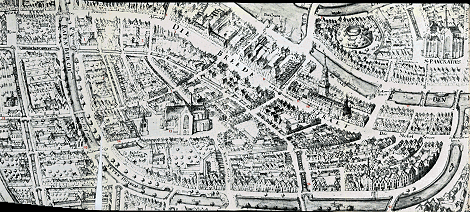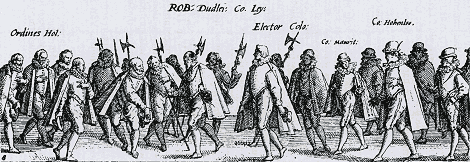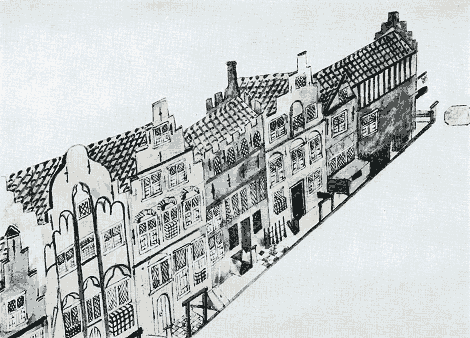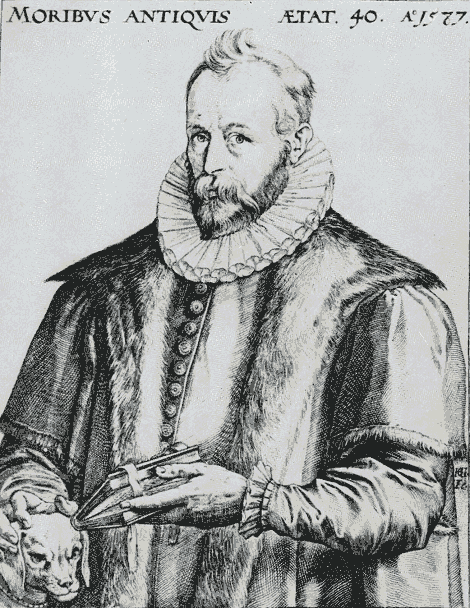Poets, Patrons, and Professors
(1962)–J.A. van Dorsten–Sir Philip Sidney, Daniel Rogers, and the Leiden Humanists
[pagina 106]
| |
II England visits LeidenBy 1585 the Netherlands could no longer, as they had done when Sidney wrote his 30th sonnet, Trust in the shade of pleasing Orange tree.Ga naar voetnoot1
Orange was dead. Antwerp was lost to the Spaniards, and the northern Provinces appeared too disorganized to resist armed pressure from the South without help and leadership from outside. To many Dutchmen the arrival of Leicester must have seemed a happy solution after years of unsuccessful negotiating. But rather than speculate on the tangle of motives, sentiments, and misunderstandings which attended the opening months of his Governor-Generalship, we must concentrate on some English writers who came with him ‘to trail a pike’ in the Low Countries. Two aspects of Leicester's campaign offer a special problem because they imply what seems a patent contradiction. On the one hand there is the undeniable fact that these months happened to be the first meeting of really large numbers of Englishmen and Dutchmen from every social layer, and that this very encounter had to a large extent been prepared in a political milieu of poets, patrons, and professors. On the other hand we find the general assumption that the ‘literary soldiers’ in Leicester's forces were then, for once, so busy discussing politics as to forsake the Muses. On closer inspection this assumption seems untenable. Ten years or more of preparations on various levels had led up to the Earl's arrival. They had been, above all, years in which a political relationship had been steadily built up by literary activities. Throughout the recent embassy, which was only a finale to the introductory period, poets had been active. Within the relatively small, but select, circle of these humanists an ideal had been established. The πρᾶξις now remained, for which | |
[pagina 107]
| |
an opportunity at last presented itself. Sidney came, as a learned soldier, and, in the words of his companion and best friend Greville, ‘this one man's example, and personall respect, did not onely encourage Learning, and Honour in the Schooles, but brought the affection, and true use thereof both into the Court, and Camp.’Ga naar voetnoot1 Baudius has already helped us to disprove ‘that he had little opportunity for patronage’Ga naar voetnoot2. Needless to say, Sidney was not the only literatus in the camp. On the contrary, it shows the campaigners' vertu to find so many men of culture in their leading ranks. Very few are outside the scope of this context.Ga naar voetnoot3 Even Leicester's physician was that first English graduate of the young University of Leiden, John James.Ga naar voetnoot4 Before moving from Court to Camp, the English leaders went on an introductory tour, travelling with Leicester on his Progress. When the new year began - on 1 January in the Dutch calendar - they were all assembled in the Province of Holland with half the distance of the magnificent entries | |
[pagina 108]
| |
still to cover. The next station was to be Leiden, an hour's ride from The Hague where Leicester was to keep his Court. Whatever could happen to his political Secours, the literary side to its background warranted another personal meeting, not in London this time but as a return visit in the one University of Holland. It would have been as unlike these English gentlemen not to have looked forward to the occasion as it would be cynical to doubt that some Leiden scholars at least were eager to entertain them.
What was the situation in Leiden meanwhile, as far as poetry was concerned, and, more particularly, how had Van Hout's ambitious Dutch programme progressed? He indeed must keep his central position, not only because four of the leading Latin poets had been away for some time, but also because the general distinction between ‘Latin Dousa’ and ‘Dutch Van Hout’ was still valid in 1586Ga naar voetnoot1. Nor had the past five years been as barren as the rare survival of Dutch verse might lead one to think. In 1581 a number of students had occupied rooms in Van Hout's house: Jacobus (van) Walraven, Jan (or Justus) van Ryswyck, Theodorus (or Dirc) (van) Lyfvelt, Winant Micault, and Van Hout's own son Bartholomeus. Each of them was registered in the Faculty of Arts, except Micault, and none is known to have left with a degree. It has been suggestedGa naar voetnoot2 that some of Van Hout's followers are perhaps to be found in this group. Lyfvelt, it is true, later made himself a minor name in Dutch literature for translating Du Bartas,Ga naar voetnoot3 but the others have successfully hidden themselves in the remotest regions of Van Hout's obscure ‘gathering’. A notable exception is Jacobus Walraven from Hoorn, not a youthful undergraduate but a man who had given up his profession | |
[pagina t.o. 109]
| |
 5
1. The Earl of Leicester, January/March 1586; old site of the University 2. George Gilpin, January 1586, in the house of Francois van Brouchoven 3. Justus Lipsius 4. Christopher Plantin's printing office 5. George Gilpin, autumn 1586 6. Geoffrey Whitney, January 1586 7. Geoffrey Whitney, when a student 8. Sir Philip Sidney, January/March 1586, in the house of Jan van Hout 9. Thomas Basson's bookshop 10. Town Hall 11. George Whetstone, January 1586 12. Lipsius' garden 13. The University 14. Thomas Basson's printing office 15. St. Peter's Church 16. Jacob Walraven 17. Janus Dousa From Jacob van Werven's copy (1744) of the original plan of Leiden by Liefrinck (1574-76). | |
[pagina 109]
| |
at an advanced ageGa naar voetnoot1 in order to hear the lecturers of Leiden. Dirck Volckertszoon Coornhert, the Haarlem poet, was the first to compliment him on his decision when, as early as 1582, he selected him for the dedication of his Comedie van de Rijckeman . There Walraven is pictured as a man whose only desire is to live for the bonae literae. An appropriate dedication it was, for nothing appears to have pleased Jacob more than the pursuit of vernacular poetry. His efforts, like Van Hout's, are now almost entirely lost; and also like Van Hout's must have been fairly continuous and not without merit, if one may judge by one quite pleasant ‘Ode’ which appeared in 1584, preceded by a Dutch sonnet of Dousa's and another Dutch ode by Van Hout, among the prefatory matter of the famous Spieghel der Zeevaerdt Ga naar voetnoot2. For the rest he was in the non-publishing amateur tradition. Janus Gruter(us), a Dutchman with an English backgroundGa naar voetnoot3, friend of Dousa and of RogersGa naar voetnoot4, and in 1602 Melissus' successor as Librarian at Heidelberg, was then no longer in Leiden. Nevertheless he must also be included, if only in absentia. It remains difficult enough to give the future Wittenberg Professor of History his rightful place in the development of Dutch literature of the preceding five years, but it is possible to revive his share in its dark origins. In April 1586 Gruterus wrote to Dousa as follows: I live ‘in otio sine negotio’, and really have begun to despair that I shall be able to keep my former name among men of letters. | |
[pagina 110]
| |
Yea, even that sweet composing of sonnets is quite abandoned; and I who once dared to pronounce these triumphant words [...Ga naar voetnoot1] am now prepared to leave it - and do leave it - to the least of all mortals. But I have chatted enough. Give the task to others, if you like. Greetings to your son, whom I would have sent a Carmen, but the last stanza has not come off yet.Ga naar voetnoot2 This reveals an early share in Van Hout's programme of Dutch poesy. Moreover, the same letter includes the (mediocre) sonnet in which he boasts of the perennial fame his Dutch Muse would bring him and which contains such statements as ‘it was I who first translated Roman verses’ - a statement of some historical importance, although the sonnet itself is also a translation.Ga naar voetnoot3 Printed evidence must come from a Dutch rendering of Lipsius' famous treatise De Constantia which Plantin's son-in-law Moretus (Jan Moerentorf) had prepared soon after its appearance in Latin. Walraven had undertaken a translation also, ‘not without consulting the author’Ga naar voetnoot4, but had abandoned | |
[pagina 111]
| |
the project when learned Moretus was found to be engaged on the same task. In 1584 the Leiden House of Plantin published an edition of Twee boecken van de stantvasticheyt. This book was exceptional in that its prefatory matter included four Dutch poems, by Van Hout and Gruterus. The former contributed an interesting 72-line ode ‘Op de Standtvasticheyt des achtbaren vermaerden ende hoochgheleerden Iusti Lipsii’, while Gruterus, future dedicatee of the younger Dousa's ‘Ἐρωτοπαίγνιον’, offered three Dutch sonnets full of curious images and idioms. The beautifully printed book truly and gracefully represented the new Leiden poets. All these minor indications naturally lead one to the conclusion that during the five years preceding the arrival of Leicester's literate companions, there was an increase of enthusiasm for a modern Dutch poetry, for translations, and for such forms as Odes and Sonnets, but always in an informal manner. In 1584 the Amsterdam Chamber of Rhetoric published at Leiden a treatise advocating the proper use of a pure mother tongue.Ga naar voetnoot1 This their poet Henric Laurens Spiegel rendered in (Dutch) verseGa naar voetnoot2 and dedicated to the University of Leiden, arguing that they should introduce the use of vernacular in the University, and praising Van Hout as the great champion of this innovation. There is an obvious connexion here with the ‘General Table of Rhetoric’, a large single sheet on which the broad rules of Dutch composition were arranged diagrammatically with simple examples to each item, issued by Plantin at Leiden in 1585.Ga naar voetnoot3 The prestige of Dutch, in other words, was gaining ground rapidly; and it even found ‘scholarly justification’ in a special preface ‘On the Worthiness of the Dutch Language’ by the scientist Simon Stevin, the first Dutch academic engineer. Stevin's Beghinselen des waterwichts of 1586 was written in the vernacular to prove the supreme clarity of northern | |
[pagina 112]
| |
Dutch.Ga naar voetnoot1 It is curious to note how all this resembled similar developments in England.
The leading poets and patrons on both sides of the Narrow Seas knew one another either personally or by report even before they met in Leiden on 12 January 1586. We know of varying degrees of intimacy between Leicester, Sidney, Gilpin, the Dousas, Lipsius, Baudius, and Hotman. With almost equal certainty we may assume that many of the others had heard much about their respective hosts or guests and that there were few complete strangers. The scarceness of documentary evidence, however, makes it necessary to proceed most cautiously. What can be noted is that these few preceding weeks probably were the ones about which Walraven speaks in his description of how he and young Dousa together with Van Hout and François van Brouchoven (the bailiff of Leiden) seriously undertook to learn EnglishGa naar voetnoot2. Nor will they have been the only ones to do so, for towards the end of January their teacher was officially permitted to ‘hold school’ for the public, the first English language school in Leiden, and probably of Holland, too. The teacher was an English refugee, Thomas Basson, who had recently set up a printing press in a house of Plantin's almost opposite the University building, the first Leiden press to do English books.Ga naar voetnoot3 In the case of Van Brouchoven, and to a lesser extent also of Van Hout, their sudden enthusiasm could be seen in view of the approaching English army as entirely utilitarian. But, since University members were exempted from billeting, that would not be the concern of Walraven and Dousa and an unknown number of others, who had no business with common soldiers and might use their French or Latin for conversation with the officers. Their motive, in short, was an interest in the English, their | |
[pagina 113]
| |
 Figure 2
Leicester welcomed in The Hague. Sidney probably walks between the Elector of Cologne and Prince Maurice. From Delineatio Pompae Triumphalis, 1586. | |
[pagina 114]
| |
language, and even in some special cases their literature. An early contingent of English cavalry had meanwhile reached the town, and Van Hout's major worry was to find suitable accommodation for the imminent arrival of Leicester and his large train. A letter which he was to write the General soon after this first visit shows that he had some reason to be concerned: We have been extremely gratified to hear of your Grace's resolution also to keep his Court in this town for some time, which will be a great honour to this city. then followed a request for the complete roll of Leicester's suite, stating the number of beds required according to rank and number of servants. This letter becomes doubly interesting because the roll has survivedGa naar voetnoot2. Exact information about Leicester's retinue is known since the billeting lists, both Van Hout's earlier versions and the improvements, are extant.Ga naar voetnoot3 These specify who visited Leiden, when, in whose house, and ‘with how many beds’.Ga naar voetnoot4 As a leading light in the town's Chambers of Rhetoric and as an experienced writer of interludes, Van Hout will also have had a hand in the preparation of pageants. Verses and mottoes were painted on cardboard, houses along the main route were hung with tapestries, sand was sprinkled on the slippery pavement, and all was prepared for the distinguished visitor. At last, on 12 January, the colourful procession reached the south gate, Leicester mounted on a white horse. Van Meet- | |
[pagina 115]
| |
kerckeGa naar voetnoot1, one of the Dutch representatives in the 1585 embassy, was there to meet him. Whether it is true that Van Meetkercke bowed so deeply as to fall from his (famished) horse, as a Catholic observer maliciously notedGa naar voetnoot2, is hard to prove and unkind to believe. Whatever the actual welcome was like, Leicester went honourably escorted to his residence in the ‘Prinsenlogement’ from where he could see the fireworks along the Rapenburg canal and some of the 157 pitchbarrels and 1725 torches and faggots which were burned in the celebrationsGa naar voetnoot3. On the other side of the Rapenburg he will have noticed the old chapel which the University had recently occupied. This ys a goodly town and very strong, and most loving people, he wrote to WalsinghamGa naar voetnoot4. Leicester's entry into Leiden at long last enabled Van Hout to see the gentlemen of whom his two best friends, Dousa and Lipsius, must have spoken often and warmly. Not only could he meet them, and perhaps try his elementary English, but being in charge of the accommodation he could favour one of them with his own spare rooms. The delightful result is that Town Secretary Van Hout, ignoring perhaps the stricter rules of courtly protocol, entered on the billeting list at his address the name of ‘Sir Philip Sidney, Governor of Flushing, with seven beds’Ga naar voetnoot5. Thus, almost next door to the Town Hall and in the same street as Professor Lipsius, Sidney spent his first days in Leiden in the house of the town's most active poet. In all probability he remained there until after Leicester's second and longer visit (21 January), or left and then returned to the same address, where he also appears to have lodged when the Governor General came for a third visit to Leiden on 10 March. | |
[pagina 116]
| |
The Earl's official entry was brief and formal in spite of all the attendant gaiety which Van Hout had arranged in his honour. His second visit nine days later, however, was more spontaneous - the result, no doubt, of a felicitous first meeting - and perhaps therefore the more rewarding to us. He came with increased numbers of attendants this time and even brought his musicians and players.Ga naar voetnoot1 Excepting Rogers, Melissus, Groslotius, and Benedicti (who was still at Cambridge or London), ‘everybody’ was present. Sidney lodged at Van Hout's house in the Breestraat, the Dousas in their town-residence at the Oosterlingplaats (now Garenmarkt), Leicester on the Rapenburg, Lipsius in his Breestraat home, Walraven in his corner house on the Steenschuur, and Hotman with Pouwels Vos, the Pensionary. Even George Gilpin, now with Van Brouchoven, had followed them, and so probably had Baudius. The University, though free from billeting, was ready to entertain the cultured guests. Seventeen days before, they had decided to send the Rector Magnificus to The Hague as their official delegate while the Senate stayed behind. But when the Earl arrived, Professors and Curators in full academicals lined up in twos and formally greeted him in front of their Academy.Ga naar voetnoot2 An austere procession it was, as if to underline the pages of Latin verse which their respectable Muse had offered the foreign patron. Even the heavily bearded Professor of Greek, Bonaventura Vulcanius, presented twenty-six lines of poetry.Ga naar voetnoot3 The University, in short, was polite and duly expectant. Leiden had numerous Catholics, and Leicester will have been popular with few of these. That, in a way, was fortunate, because it is due to the hard feelings and the diary of one of them that an indication of what went on in Leiden has come down to us. The following entry should in all fairness be given in full: | |
[pagina t.o. 116]
| |
 6. Sidney's Leiden residence in January 1586: the house of Jan van Hout
(fourth from the left) on the Breestraat near ‘the blue stone’ (upper right corner).
From a contemporary water-colour on parchment. | |
[pagina t.o. 117]
| |
 7. Justus Lipsius in 1587.
Engraving by Hendrick Goltzius. | |
[pagina 117]
| |
When he [i.e. Leicester] was in Leiden, he wanted to see that famous University and there to hear Justus Lipsius, literator of great repute, publicly explaining Tacitus' Agricola. Lipsius' lecture must have been for many an enlightened member of his courtly English audience an occasion of some significance in the sequence of Anglo-Leiden literary contacts. Seated or standing in the ‘greater auditory’, the English nobles and their friends together with the Leiden doctores and undergraduates listened to the pride of the Academy lecturing on Tacitus (his special subject) in that characteristic pose seen in the Goltzius engravingGa naar voetnoot4, a book in one hand, and the other on the head of Mopsus, his favourite dogGa naar voetnoot5. Much of Lipsius' fame rested on his De Constantia - a theme, incidentally, the propagation of which many were to hold against him when he moved to Louvain five years later. ‘Lipsius,’ said Fynes Moryson in 1592, ‘whom I loved for his Booke of Constancy, did bereave me of this hope, when I came to the Low-Countreys, by his inconstant flight to the Spaniards’Ga naar voetnoot6. But flying to the Spaniards seemed as yet far removed from Lipsius' mind. Perhaps it was during this English repast that he made his host a present of the renowned treatise, a copy of which with the author's autograph in- | |
[pagina 118]
| |
scription to the Earl of Leicester still existsGa naar voetnoot1. For the rest we can only guess as to the actual circumstances under which they met and talked in the days of which Lipsius wrote: ‘The Earl himself, and Sidney, too, we have had with us; the Princeps is indeed an honourable, benign, Heroic man: the other, his kinsman, son of his sister, has remarkable prudence and wisdom.’Ga naar voetnoot2 The visit proved to him the truth of his earlier pronouncement when he had said, with special reference to Sidney: Blessed is England in this, that its nobility is truly noble, educated as it is in studies of virtus and doctrina.Ga naar voetnoot3 |
|

